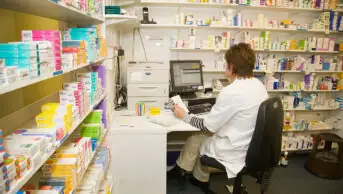
Shutterstock.com
The Pharmacy Schools Council (PhSC) has expressed concerned over difficulties recruiting to academic staff roles within pharmacy schools, following an increase in the number of students undertaking MPharm programmes.
A statement published on 8 August 2024 said that although the PhSC welcomed the growth in pharmacy student numbers, MPharm heads of school are worried about being able to recruit enough staff to run the courses.
The PhSC noted that there are currently 29 accredited pharmacy schools in the UK. In addition to these, one school — Swansea University — is close to accreditation and two more courses (the University of Leicester and the University of Bath in partnership with the University of Plymouth) are due to accept their first cohorts in September 2024.
“At least seven more universities in the UK are in the early stages of accreditation for new MPharm programmes,” it added.
The ‘NHS long-term workforce plan for England’, published in June 2023, showed a planned growth of pharmacists in training in England in 2028 by nearly 30% on the 2022 baseline of approximately 3,400 students, and by nearly 50% on the 2022 baseline to “around 5,000” by 2031.
In December 2023, the University of Bath announced that it would offer its MPharm programme at the University of Plymouth from September 2024 as part of a drive to cut pharmacist workforce shortages in the south west of England.
“Whilst these new schools will enhance the number of undergraduate places available to study pharmacy in the UK, current heads of school have expressed concerns around the current difficulties in recruiting suitably qualified staff in all the fields required to run an MPharm programme,” the PhSC said.
“This is particularly acutely felt when the need is to recruit practising pharmacists with the correct clinical expertise to deliver the increased core clinical components of the MPharm.
“Financial pressures within the healthcare education sector… mean that heads of school are under pressure to either manage with a smaller staff base… or to recruit at lower grades,” it added.
Heads of school attending the April 2024 PhSC meeting raised that academic careers need to be made a more attractive option for pharmacists, and there was a need to look at ways to prepare individuals for an academic career without following the traditional PhD route.
The PhSC also pointed out that pharmacy schools are competing with the NHS when it comes to filling teacher-practitioner roles and that using secondments to recruit senior pharmacists to academic posts should be explored as an option.
“We are therefore formally raising our concerns about the currently uncontrolled increase in schools of pharmacy in the UK without a commensurate investment from the NHS in any of the home nations in training at undergraduate level,” it said.
“We would welcome discussions with chief pharmaceutical officers on this matter.”
In July 2023, the PhSC warned that growth in MPharm student numbers would need to be accompanied by greater capacity in all pharmacy sectors to accommodate student placements, and that universities would need extra funding to provide these placements.
Claire Anderson, president of the Royal Pharmaceutical Society (RPS), said: “It is crucial that we ensure initial education and training is of high quality and reflects practice to support the development of an effective and capable workforce.
“To achieve this, we need to embed teaching into everyday practice by involving all sectors of pharmacy in providing clinical placements for students and ensuring pharmacists have protected time for their own professional development, as well as protected time to support others.
“A pharmacy workforce plan that includes pharmacy teams in all settings, including academia and industry, would help secure the longevity of the profession and protect the workforce pipeline. It is important that pharmacists from diverse backgrounds with clinical, research and practice-based experience are embedded as part of pharmacy schools to ensure the right skill mix and expertise,” she said.
Anderson added that the RPS report on the differential attainment and awarding gap in pharmacy — ‘Chasing equality in pharmacy training’, published in February 2024 — “highlights the importance of having teaching staff that reflect the diversity of our profession”.
“By bringing in educators from diverse backgrounds, we provide our students with access to different experiences and role models, and we create a more inclusive environment that can encourage more diverse individuals to pursue teaching roles within the pharmacy degree programme,” she said.


